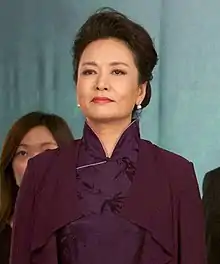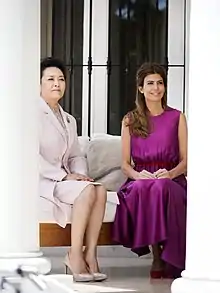Peng Liyuan
Peng Liyuan (Chinese: 彭丽媛; pinyin: Péng Lìyuán; born 20 November 1962) is a Chinese soprano and contemporary folk singer and the spouse of Xi Jinping, current General Secretary of the Chinese Communist Party and President of the People's Republic of China.
Peng Liyuan | |
|---|---|
彭丽媛 | |
 | |
| Spouse of the Paramount Leader of the People's Republic of China | |
| Assumed role 15 November 2012 | |
| General Secretary | Xi Jinping |
| Preceded by | Liu Yongqing |
| Spouse of the President of the People's Republic of China | |
| Assumed role 14 March 2013 | |
| President | Xi Jinping |
| Preceded by | Liu Yongqing |
| President of the People's Liberation Army Academy of Art | |
| In office May 2012 – July 2017 | |
| Preceded by | Zhang Jigang |
| Succeeded by | Zhang Qichao |
| Member of the Chinese People's Political Consultative Conference (9th, 10th, 11th) | |
| In office February 1998 – March 2013 | |
| Chairman | Li Ruihuan Jia Qinglin |
| Personal details | |
| Born | 20 November 1962 Yuncheng County, Shandong, China |
| Political party | Chinese Communist Party |
| Spouse | |
| Children | Xi Mingze |
| Alma mater | China Conservatory of Music |
| Occupation | Singer, Professor of vocal music |
| Profession | Soprano and (first holder of a master's degree in) "Chinese ethnic vocal music" (中国民族声乐) |
| Signature |  |
| Military service | |
| Allegiance | China |
| Branch/service | People's Liberation Army |
| Years of service | 1980–2017 |
| Rank | Major General |
| Commands | People's Liberation Army Academy of Art |
Peng gained popularity as a singer from her regular appearances on the annual CCTV New Year's Gala, a widely viewed Chinese television program that airs during the Chinese New Year.[1] She won honors in singing competitions nationwide.[1] Her most famous singles include《父老乡亲》("People from Our Village"),《珠穆朗玛》("Zhumulangma"), and《在希望的田野上》("In the Field of Hope"). Peng also sang the theme songs of several popular TV series, such as The Water Margin (1998). She also starred in musical productions. In 1986, she received the Plum Blossom Award, China's highest theatrical award, for her lead role in The White Haired Girl.[2] She was the president of then People's Liberation Army Academy of Art between 2012 and 2017, and vice president of the All-China Youth Federation between 2005 and 2010.[3] Peng was a civilian member of the People's Liberation Army and held the civilian rank equivalent to Major General before she was appointed the Art Academy's dean, upon which she was given the formal rank.[1]
She is known within China for her fashion sense, credited to her personal couturier Ma Ke.[4][5][6][7] In 2014, Peng was listed as the 57th Most Powerful Woman in the World by Forbes.[8]
Biography

Peng Liyuan was born in Yuncheng County, Shandong Province, China. She is the daughter of Peng Longkun, an official in charge of cultural affairs who was branded a "counter-revolutionary" during the Cultural Revolution because some of his relatives had served in the Taiwanese army.[9][10]
Peng joined the People's Liberation Army in 1980, when she was 18 years old, as an ordinary soldier.[11] She first performed nationally and came to fame during the earliest rendition of the CCTV New Year's Gala in 1982, when she performed On the Plains of Hope.
Shortly after the 1989 Tiananmen Square protests and massacre, Peng sang for the troops. A photo of Peng, wearing a green military uniform, singing to helmeted and rifle-bearing troops seated in Tiananmen Square was censored from China's Internet. The image was from the back cover of a 1989 issue of the People's Liberation Army Pictorial, a publicly available military magazine.[12][13][14]
For the greater part of her relationship with Xi, Peng has enjoyed a positive reputation within China.[1] Her husband became the General Secretary of the Chinese Communist Party in November 2012 and President of the People's Republic of China in March 2013.[15][1] She is actively involved in politics and is a member of the 11th National Committee of the Chinese People's Political Consultative Conference. She has been a WHO Goodwill Ambassador for tuberculosis and HIV/AIDS since 2011.[16]
On 20 November 2014, Massey University in New Zealand conferred upon Peng an Honorary Doctorate in recognition of her "international contributions to the performing arts and health and education programmes".[17] In 2016, she was named UNESCO Special Envoy for the Promotion of Girls' and Women's Education.[18] Peng sang in a song-and-dance number in 2007 shown on Chinese television that featured Tibetans thanking the Chinese military for "liberating" them.[19] On 6 December 2017, Juilliard School, a private performing arts conservatory in New York City, also conferred Peng an Honorary Doctorate at the China Conservatory of Music in Beijing, in recognition of her accomplishment as an outstanding artist, and also for her contribution to cultural exchanges between China and the United States.[20]
Personal life
Peng Liyuan was introduced by friends to Xi Jinping in 1986, when Xi was working as the deputy mayor of the eastern port city of Xiamen, Fujian. Xi was reportedly academic during their courtship, inquiring about singing techniques.[1] The couple married on 1 September 1987. Four days later, Peng Liyuan returned to Beijing to appear in the National Art Festival, and then immediately departed for the United States and Canada to perform. Since that time, Xi and Peng have led largely separate lives, with Peng spending most of her time in Beijing and her husband spending his time in Fujian and later in Zhejiang. They have one child, a daughter named Xi Mingze, who was born in 1992.[21] Peng is a practicing Buddhist.[22]
References
- "Meet China's Folk Star First Lady-in-Waiting: Peng Liyuan". The Wall Street Journal. 13 February 2012. ISSN 0099-9660. Archived from the original on 14 November 2020. Retrieved 28 June 2023.
- "'The White Haired Girl': 70 years on". China Daily. 28 December 2015. Archived from the original on 11 March 2020. Retrieved 4 April 2020.
- "Peng Liyuan, a symbol of China's soft power". Gulf News. Archived from the original on 31 August 2021. Retrieved 28 April 2020.
- "Fashion diplomacy: 8 most stylish stateswomen of our times". South China Morning Post. Archived from the original on 4 August 2019. Retrieved 24 June 2018.
- "China's First Lady Peng Liyuan gives Melania Trump a run for her fashion money". The Straits Times. 10 November 2017. Archived from the original on 4 August 2019. Retrieved 24 June 2018.
- "Meet the designer behind China's first lady". CNN. 17 November 2016. Archived from the original on 4 August 2019. Retrieved 24 June 2018.
- "Melania Trump takes fashion diplomacy to new lengths in China". South China Morning Post. Archived from the original on 4 August 2019. Retrieved 24 June 2018.
- "The World's 100 Most Powerful Women". Forbes. Archived from the original on 22 June 2019. Retrieved 26 June 2014.
- "Together They Hold Up the Sky: The Story China's Xi Jinping and Peng Liyuan". Caixin. 19 April 2013. Archived from the original on 23 October 2022. Retrieved 23 October 2022.
- "Peng Liyuan: Folk singer who became China's first lady". BBC News. 5 June 2013. Archived from the original on 23 October 2022. Retrieved 23 October 2022.
- "Peng Liyuan describes her own time in the army". Economic Daily (in Chinese). 1 July 2004. Archived from the original on 24 October 2017. Retrieved 28 May 2008.
- "彭麗媛六四後舊照曝光 外媒:令中國尷尬的照片". Apple Daily. 29 March 2013. Archived from the original on 16 December 2013. Retrieved 11 November 2017.
- "第一夫人觸屠殺敏感話題 彭麗媛六四勞軍照 閃電刪除". Apple Daily. 30 March 2017. Retrieved 11 November 2017.
- "中國第一夫人/彭麗媛 遭爆高歌慰勞六四屠殺部隊". Liberty Times. 30 March 2013. Archived from the original on 16 December 2013. Retrieved 11 November 2017.
- Makinen, Julie (21 October 2012). "China's incoming first lady a challenge for the image makers". Los Angeles Times. Archived from the original on 7 May 2023. Retrieved 28 June 2023.
- "UN health agency appoints Chinese singer as Goodwill Ambassador". United Nations. 3 June 2011. Archived from the original on 9 November 2017. Retrieved 29 June 2017.
- "Honorary doctorate for China's First Lady". Massey University. 18 November 2014. Archived from the original on 8 March 2021. Retrieved 3 May 2020.
- "Peng Liyuan: "The equality of opportunity is fundamental"". UNESCO. Retrieved 12 September 2023.
- Beech, Hannah (29 October 2012). "As China Readies for Transition, 7 Tibetan Self-Immolations in 7 Days". Time. ISSN 0040-781X. Archived from the original on 27 January 2023. Retrieved 28 June 2023.
- Chen, Nan (10 December 2017). "Peng receives honorary Juilliard doctorate". China Daily. Archived from the original on 12 August 2022. Retrieved 13 August 2022.
- Staff Reporter (16 February 2012). "Red Nobility: Xi Jinping's Harvard daughter". Want China Times. Archived from the original on 20 November 2012. Retrieved 7 November 2012.
- Yanzhong Huang (21 March 2014). "Is Peng Liyuan China's Evita?". Council on Foreign Relations. Archived from the original on 30 November 2022. Retrieved 30 November 2022.
- "Peng Liyuan". Chinese Posters. Archived from the original on 15 August 2022. Retrieved 13 August 2022.
External links
- Kavanagh, Jim. "Peng Liyuan Archived 4 March 2016 at the Wayback Machine." CNN. 20 January 2011.
- "China's Likely Next First Lady is a Famous Singer". The New York Times. 14 February 2012.
